Small overlap front: driver-side
Rating applies to 2009-16 models
Tested vehicle: 2012 Audi A4 2.0T Premium 4-door 2wd
The Audi A4 was redesigned for the 2009 model year. Two tests of the A4 were conducted because, in the first test, the vehicle's electrical system did not deploy the airbags due to a crash test preparation error. As a result, ratings for restraints and dummy kinematics and dummy injuries are based only on the second test. Structural ratings are based on both tests.
| Evaluation criteria | Rating |
|---|---|
| Structure and safety cage | |
| Driver injury measures | |
| Head/neck | |
| Chest | |
| Hip/thigh | |
| Lower leg/foot | |
|
Driver restraints and dummy kinematics
In the second test, the dummy’s head contacted the frontal airbag but slid off the left side as the steering column moved 18 cm to the right, leaving the head vulnerable to contact with forward structure and resulting in little airbag cushioning for the chest. The side curtain airbag deployed and had sufficient forward coverage to protect the head from contact with side structure and outside objects. The driver door opened during the crash, which shouldn't happen because the driver could be partly or completely ejected from the vehicle. | |
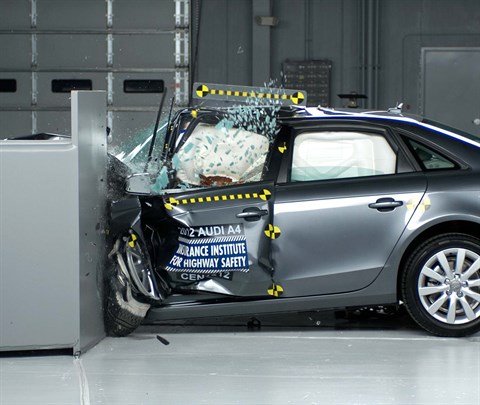
Action shot taken during the second of two small overlap frontal crash tests.
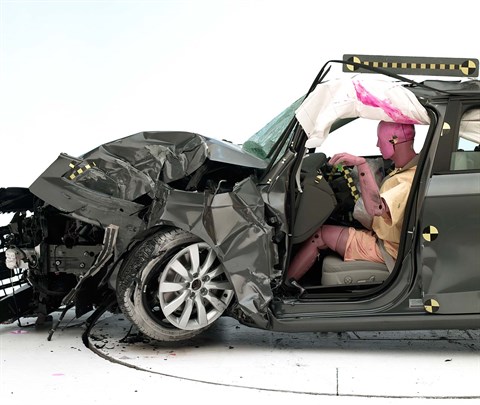
The dummy's position in relation to the door frame, steering wheel, and instrument panel after the crash test indicates the driver's survival space wasn't maintained well (second test with front and side curtain airbag deployment).
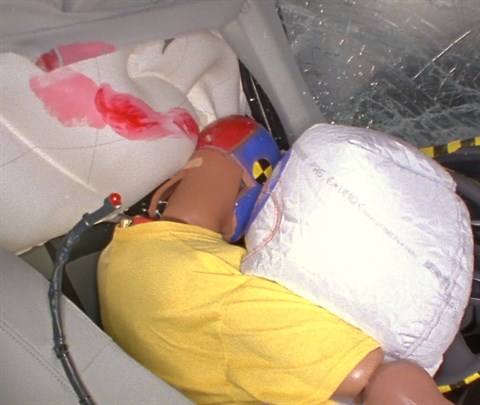
In the second test, the dummy moved to the left and its head slid around the left side of the frontal airbag.
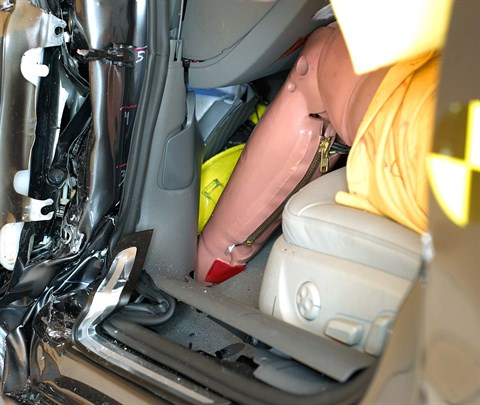
Extensive intrusion by the instrument panel and footwell contributed a high risk of injury to the dummy's left hip.
Moderate overlap front: original test
Rating applies to 2009-16 models
Tested vehicle: 2009 Audi A4 2.0T quattro 4-door 4wd
The Audi A4 was redesigned for the 2009 model year. Moderate overlap frontal ratings are assigned by the Institute based on a test conducted by Volkswagen/Audi.
The moderate overlap frontal crash test ratings also apply to the station wagon version of the A4, known as the A4 Avant, also redesigned for 2009.
| Evaluation criteria | Rating |
|---|---|
| Overall evaluation | |
| Structure and safety cage | |
| Driver injury measures | |
| Head/neck | |
| Chest | |
| Leg/foot, left | |
| Leg/foot, right | |
| Driver restraints and dummy kinematics | |
Side: original test
Rating applies to 2009-16 models
Tested vehicle: 2009 Audi A4 2.0T Premium quattro 4-door 4wd with standard front and rear head curtain airbags and standard front seat-mounted torso airbags
The Audi A4 was redesigned for the 2009 model year. The side impact crash test ratings also apply to the station wagon version of the A4, known as the A4 Avant, also redesigned for 2009.
| Evaluation criteria | Rating |
|---|---|
| Overall evaluation | |
| Structure and safety cage | |
| Driver injury measures | |
| Head/neck | |
| Torso | |
| Pelvis/leg | |
| Driver head protection | |
| Rear passenger injury measures | |
| Head/neck | |
| Torso | |
| Pelvis/leg | |
| Rear passenger head protection | |
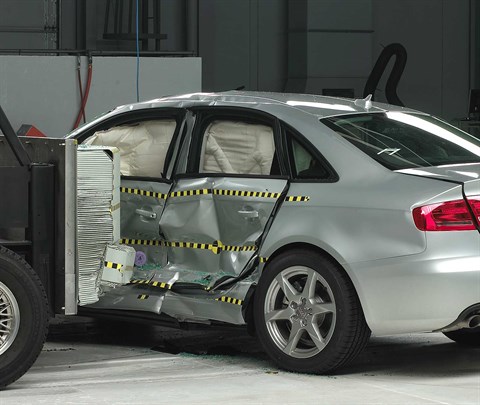
View of the vehicle and barrier just after the crash test.
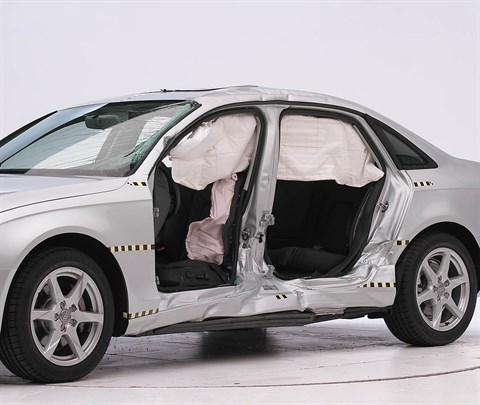
View of the vehicle after the crash with doors removed, showing the side airbags and damage to the occupant compartment.
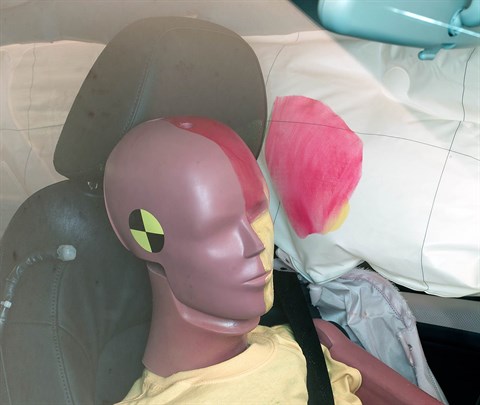
Smeared greasepaint shows where the driver dummy's head was protected from being hit by hard structures by the side curtain airbag.

Smeared greasepaint shows where the rear passenger dummy’s head was protected by the side airbag.
Roof strength
Rating applies to 2009-16 models
Tested vehicle: 2010 Audi A4 2.0T Premium 4-door 2wd
| Overall evaluation | |
|---|---|
| Curb weight | 3,523 lbs |
| Peak force | 16,197 lbs |
| Strength-to-weight ratio | 4.60 |
Head restraints & seats
Seat type: Power leather seats built after Sept 2008
| Overall evaluation | |
|---|---|
| Dynamic rating | |
| Seat/head restraint geometry |
About the head restraint & seat test
Currently, IIHS tests apply only to front seats.
Headlights
Trim level(s)
- All trims
| Evaluation criteria | Rating |
|---|---|
| Low-beam headlight type | HID projector |
| High-beam headlight type | HID projector |
| Curve-adaptive? | No |
| High-beam assist? | No |
|
Overall rating | |
| Distance at which headlights provide at least 5 lux illumination: | |
Low beams
On the straightaway, visibility was fair on both sides of the road. On curves, visibility was fair on the sharp left and both right curves and inadequate on the gradual left curve.
The low beams never exceeded glare limits.
High beams
On the straightaway, visibility was fair on the right side of the road and inadequate on the left side. On curves, visibility was fair on the gradual right and both left curves and inadequate on the sharp right curve.
